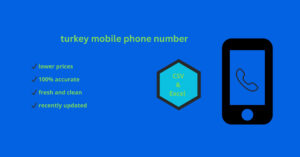Seasonal marketing focuses on creating promotional strategies around specific dates on the calendar, usually times when demand for certain products or services rises. Applying it effectively requires a global and strategic approach, especially in the b2b and technological field, where the relationship with the customer and understanding the purchasing cycle are fundamental.
To implement an effective seasonal marketing approach, the following actions must be taken:
Data research and analysis: Understand past purchasing trends to anticipate future needs.
Identification of key dates: analyze the turkey mobile phone number calendar and choose the dates that present opportunities for your business.

Strategic planning: design action plans and campaigns adapted to the selected dates.
Adaptation of messages and creatives: align your brand message with the theme of the season.
Offer optimization: adapt your portfolio to what customers are looking for at key moments.
Analysis of results: after each campaign, review the results and adjust strategies for future seasonal events.
For b2b and technology sectors, it is crucial to understand that purchases are made after careful consideration and that relationships are long-term. Campaigns should not focus solely on discounts, but rather show how technology products can improve customer operations or profitability in these specific periods.
Calendar of dates in Spain
Here is a list of key seasonal dates in Spain, which can be used to plan seasonal marketing campaigns:
new year (January 1)
Valentine's Day (February 14)
holy week (movable, usually in March or April)
labor day (may 1)
mother's day (first sunday in may)
summer holidays (July and August)
back to school (September)
All Saints' Day (November 1)
black friday (last friday in november)
Cyber Monday (following Monday after Black Friday)
Christmas (December 25)
wise men (January 6)
dates by autonomous community:
Madrid: San Isidro (May 15)
catalonia: sant jordi (april 23) and the day (september 11)
Andalusia: Andalusia Day (February 28) and April Fair (movable, after Easter)
Galicia: Galicia Day (July 25)
Valencia: Las Fallas (March 15-19) and La Tomatina (last Wednesday of August, Buñol)
Basque Country: main week (semana grande de Bilbao, in August)
Navarra: San Fermin (July 6-14)
Canary Islands: Canary Islands Day (May 30) and Santa Cruz de Tenerife Carnival (movable, between February and March)
Balearic Islands: Balearic Islands Day (March 1)
Aragon: Aragon Day (April 23)
Extremadura: Extremadura Day (September 8)
castile and león: festival of castile and león (april 23)
cantabria: cantabria day (second sunday in august)
Murcia: side of the garden (Tuesday after Easter)
Asturias: Asturias Day (September 8)
La Rioja: San Mateo (September 20 to 26)
Castilla-La Mancha: Castilla-La Mancha Day (May 31)
Ceuta: Ceuta Day (September 2)
melilla: melilla day (september 17)"
adaptation of the message and creatives
Adapting messaging and creatives are vital to connecting with audiences on an emotional level during key seasons. This implies:
